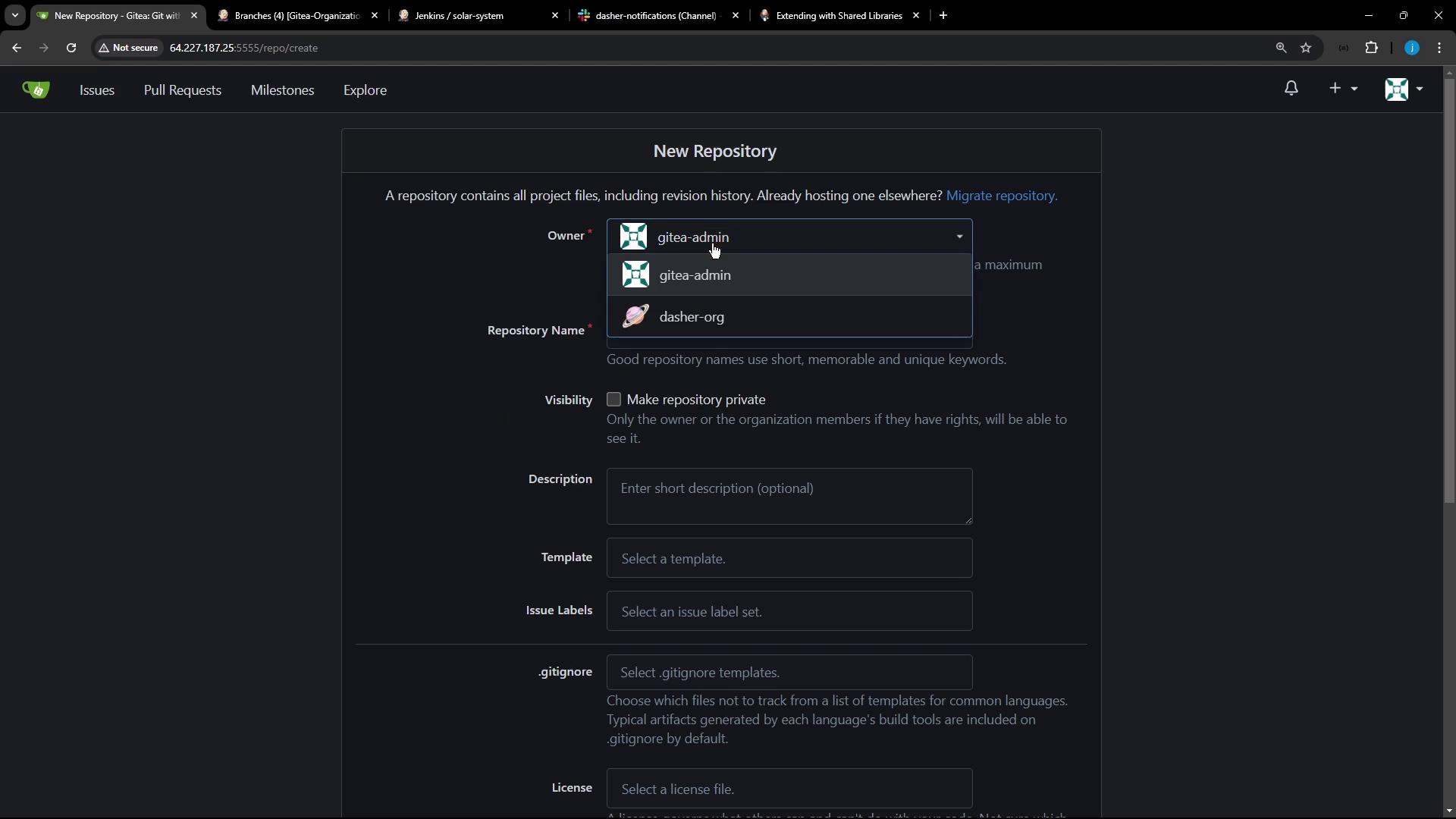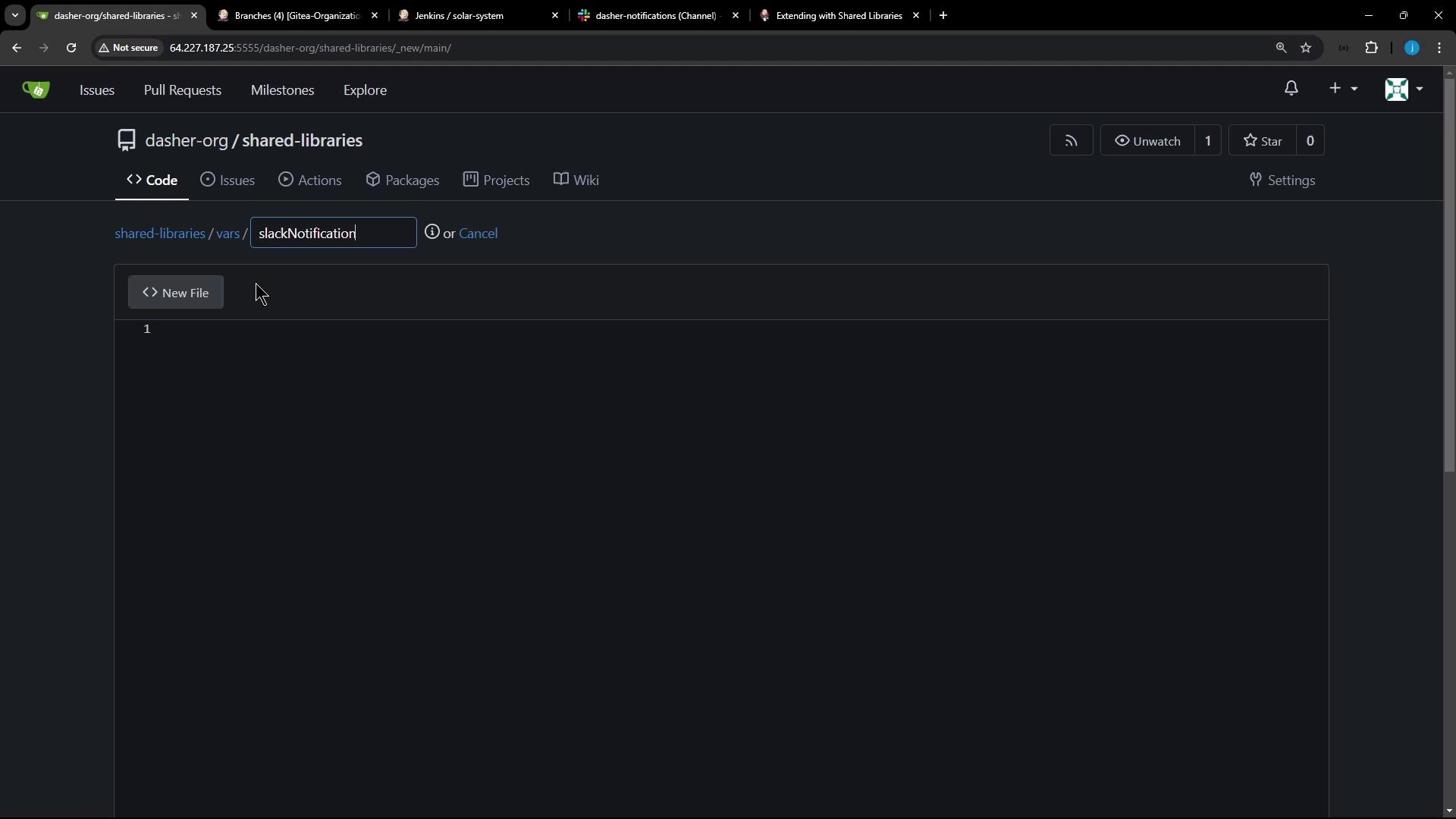Certified Jenkins Engineer
Shared Libraries in Jenkins
Demo Create a Shared Library for Slack Notification
Learn how to extract common Slack notification logic into a reusable Jenkins Shared Library for consistent alerts across multiple pipelines.
Why Use a Shared Library?
Embedding Slack notification code directly in each Jenkinsfile leads to duplicate scripts and maintenance headaches. A Shared Library lets you:
- Centralize notification logic
- Update formats or colors in one place
- Enforce consistent Slack workflows organization-wide
Example of duplicated code in a typical Jenkinsfile:
def slackNotificationMethod(String buildStatus = 'STARTED') {
buildStatus = buildStatus ?: 'SUCCESS'
// ... color logic ...
slackSend(color: color, message: msg)
}
1. Create the Shared Library Repository
- In your Git hosting platform (e.g. Gitea, GitHub), create a new repository named
shared-librariesunder your organization (dasher-org).

- Initialize and push to
main:
touch README.md
git init
git checkout -b main
git add README.md
git commit -m "Initialize shared library repository"
git remote add origin http://64.227.187.25:5555/dasher-org/shared-libraries.git
git push -u origin main
2. Define the Repository Layout
Jenkins Shared Libraries follow this directory structure:
(shared-libraries)
├── src
│ └── org
│ └── foo
│ └── Bar.groovy
├── vars
│ ├── foo.groovy
│ └── foo.txt
└── resources
└── org
└── foo
└── bar.json
src/org/...holds Groovy classes.vars/contains global scripts (e.g.,slackNotification.groovy) and help text.resources/stores static assets like JSON.
Learn more in the Jenkins Shared Library Documentation.
3. Add Slack Notification Logic
Create vars/slackNotification.groovy:

// vars/slackNotification.groovy
def call(String buildStatus = 'STARTED') {
// Default to SUCCESS if unset
buildStatus = buildStatus ?: 'SUCCESS'
// Map statuses to Slack colors
def color = switch (buildStatus) {
case 'SUCCESS' -> '#47ec05'
case 'UNSTABLE' -> '#d5ee0d'
default -> '#ec2805'
}
// Construct and send the notification
def msg = "${buildStatus}: ${env.JOB_NAME} #${env.BUILD_NUMBER}\n${env.BUILD_URL}"
slackSend(color: color, message: msg)
}
Note
Defining a call method lets you invoke slackNotification() directly in your pipeline like a built-in step.
Build Status Color Reference
| Build Status | Slack Color Code |
|---|---|
| SUCCESS | #47ec05 |
| UNSTABLE | #d5ee0d |
| Others | #ec2805 |
4. Use the Shared Library in Your Pipeline
- Go to Manage Jenkins > Configure System.
- Under Global Pipeline Libraries, add:
- Name:
shared-libraries - Default version:
main - Retrieval method: Modern SCM (Git)
- Name:
Then in any Jenkinsfile:
@Library('shared-libraries') _
pipeline {
agent any
stages {
stage('Build') {
steps {
echo 'Building...'
}
}
stage('Notify') {
steps {
// Default status SUCCESS
slackNotification()
// Or custom status:
// slackNotification('FAILURE')
}
}
}
}
Warning
Ensure the Slack Notification plugin is installed and a valid Slack workspace credential is configured under Manage Jenkins > Configure System.
Links and References
Watch Video
Watch video content